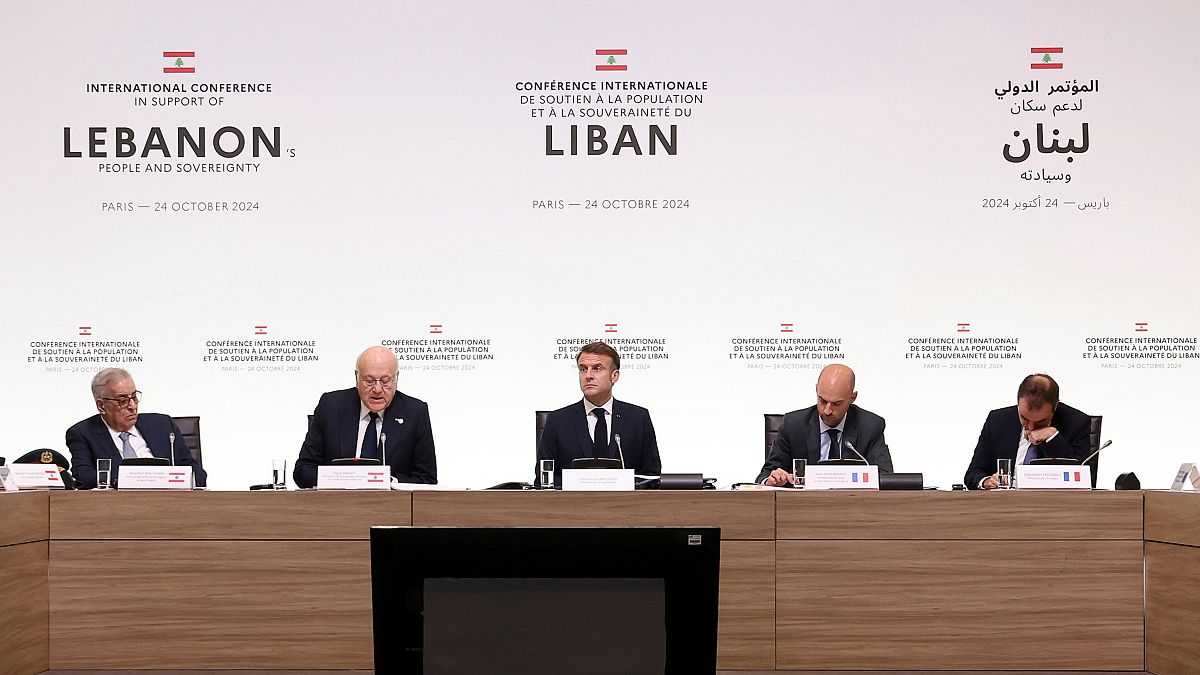The war between Hezbollah and Israel has resulted in extensive damage to areas of southern Lebanon and Beirut due to airstrikes. An international aid conference held in Paris aimed to raise funds to support Lebanon amidst increasing attacks by Israel. The conference successfully raised a total of $1 billion in pledges, with France contributing €740 million in humanitarian aid and €185 million for the Lebanese security forces. French President Emmanuel Macron called upon over 70 countries and international organisations to provide aid to Lebanon, emphasizing the urgent need to support displaced populations and hosting communities. Macron announced France’s pledge of €92.5 million, while Italy and Germany also committed €10 million and €60 million respectively. The donations are crucial to address the UN’s estimated requirement of at least $426 million to provide humanitarian aid to over 4 million Lebanese residents in need.
The ongoing conflict between Hezbollah militants and Israel has led to the displacement of millions of Lebanese people, along with more than 2,500 fatalities and exacerbated the country’s existing economic crisis. The war escalated in September following a series of incidents along the Israel-Lebanon border, resulting in significant injuries and casualties in Lebanon due to Israel’s actions. Macron reiterated the importance of an immediate ceasefire during the aid conference and criticized Israel for its continued military operations in Lebanon. While emphasizing France’s commitment to Israel’s security, Macron warned against the escalation of violence, stating that adding war to war would not bring peace or security to the region.
The conference’s focus on securing pledges for humanitarian aid reflects the immediate needs of the Lebanese population affected by the conflict. Macron stressed the necessity of providing shelter, food, medical care, and education to those impacted by the war. The funds raised are intended to alleviate the suffering and support the recovery efforts in Lebanon. The collective contributions from various countries and organisations demonstrate global solidarity with Lebanon during this challenging time. By meeting the estimated funding requirements, the conference aims to ensure that vital resources reach those most in need and facilitate the country’s humanitarian response to the crisis.
In response to the escalating violence and humanitarian crisis in Lebanon, the aid conference in Paris served as a platform for international cooperation and support. The high level of participation from countries and organisations highlights the global recognition of the urgency to address the humanitarian needs in Lebanon. Macron’s call for an immediate ceasefire and critical stance towards Israel’s military actions underscore the importance of promoting peace and stability in the region. The pledges made during the conference provide hope for the Lebanese population and demonstrate the international community’s commitment to alleviating the suffering caused by the conflict. Moving forward, continued support and cooperation will be essential in addressing the humanitarian crisis and fostering long-term stability in Lebanon.
In conclusion, the aid conference in Paris has paved the way for substantial contributions towards humanitarian assistance in Lebanon, as the country grapples with the devastating impact of the war between Hezbollah and Israel. The pledges made during the conference will play a crucial role in addressing the urgent needs of displaced populations, providing essential services, and supporting recovery efforts in Lebanon. Macron’s leadership in convening the conference and advocating for a ceasefire reflects the international community’s commitment to promoting peace and stability in the region. By working together to support Lebanon, countries and organisations have demonstrated solidarity with those affected by the conflict and reaffirmed their commitment to addressing humanitarian crises. The success of the conference in securing significant pledges underscores the collective effort to alleviate the suffering in Lebanon and build a foundation for recovery and resilience in the country.










